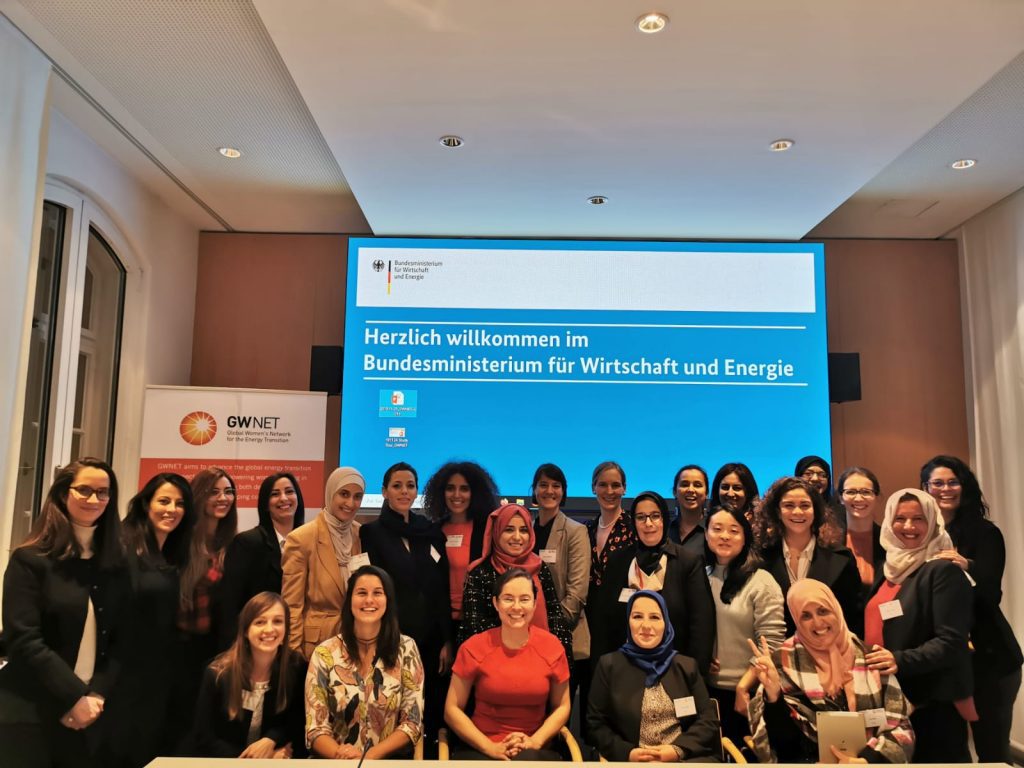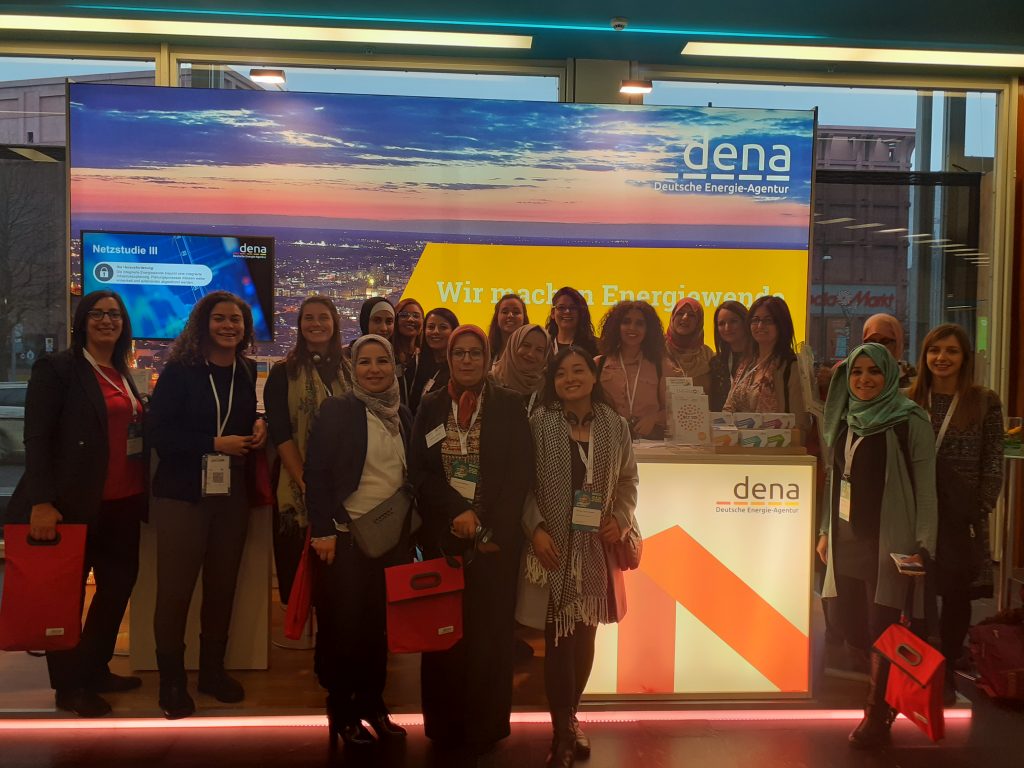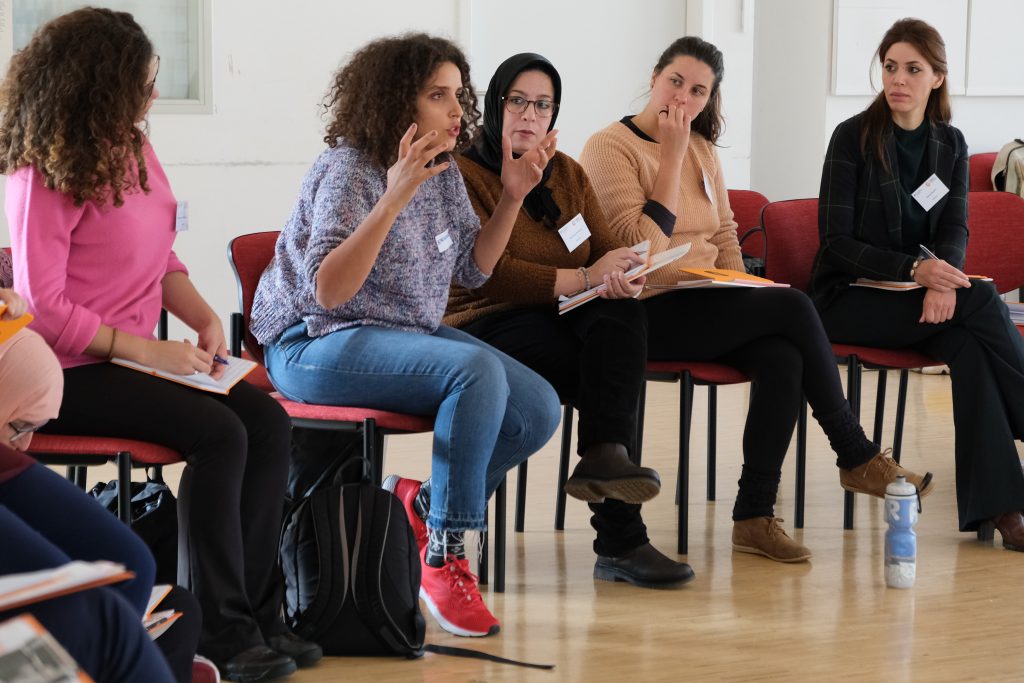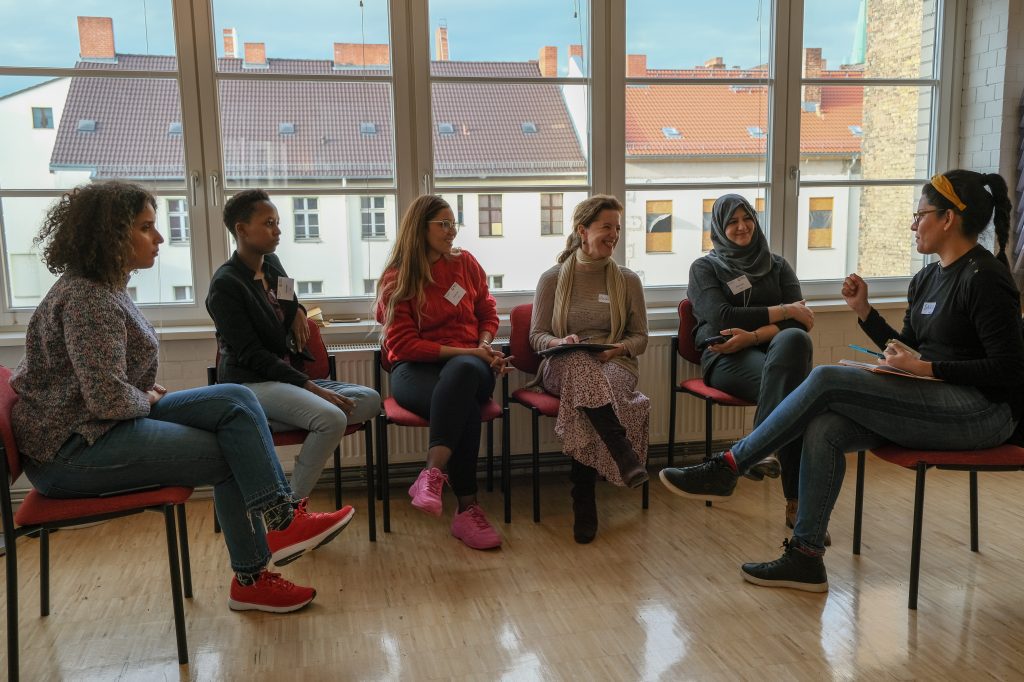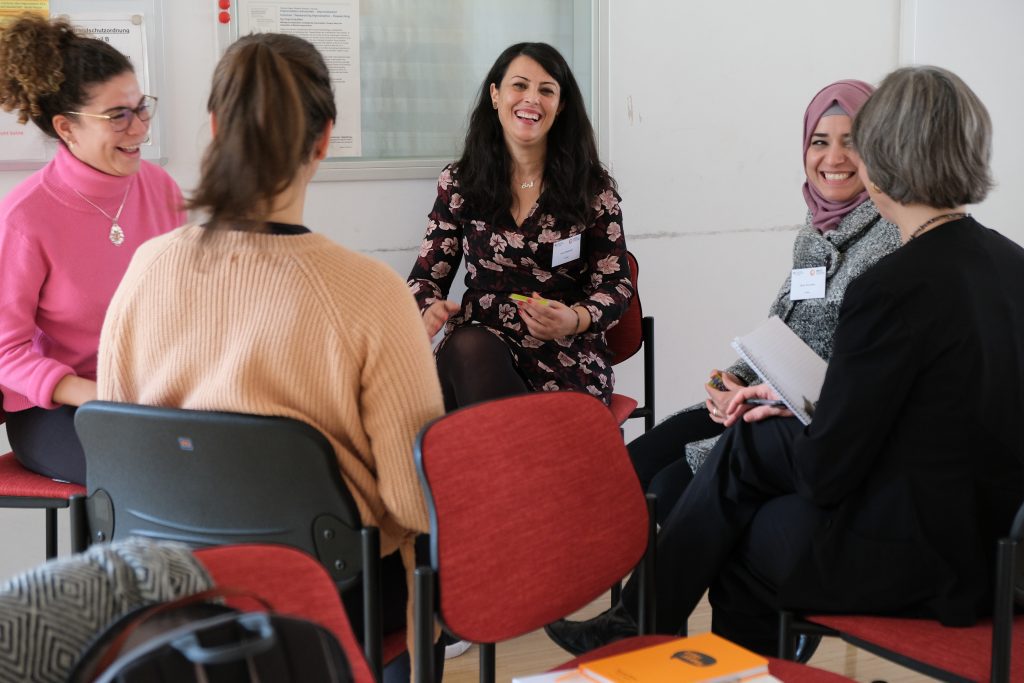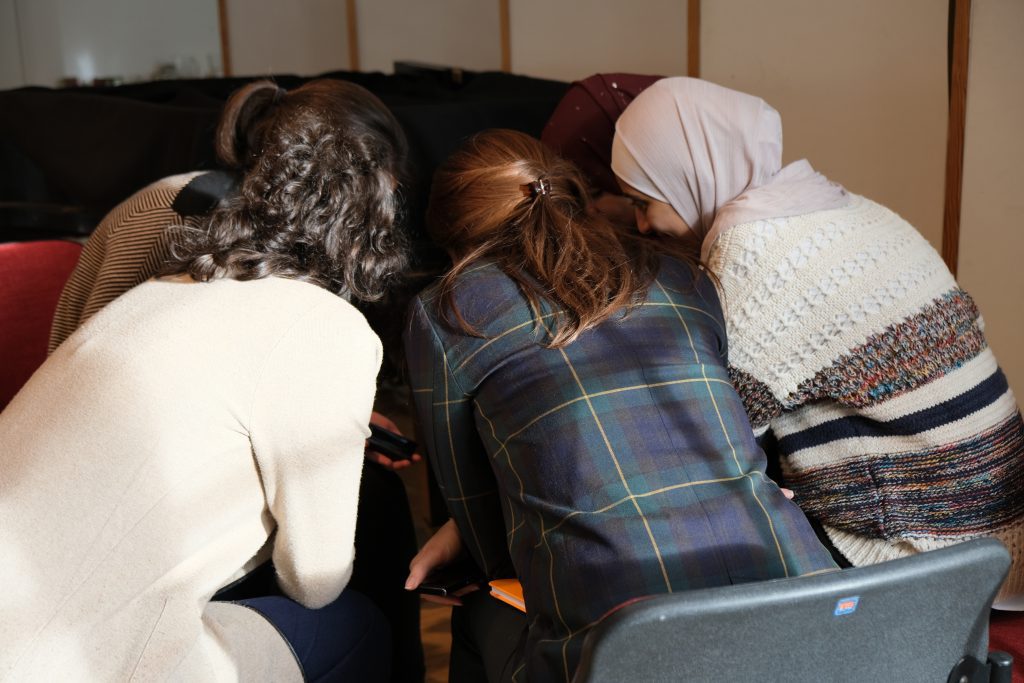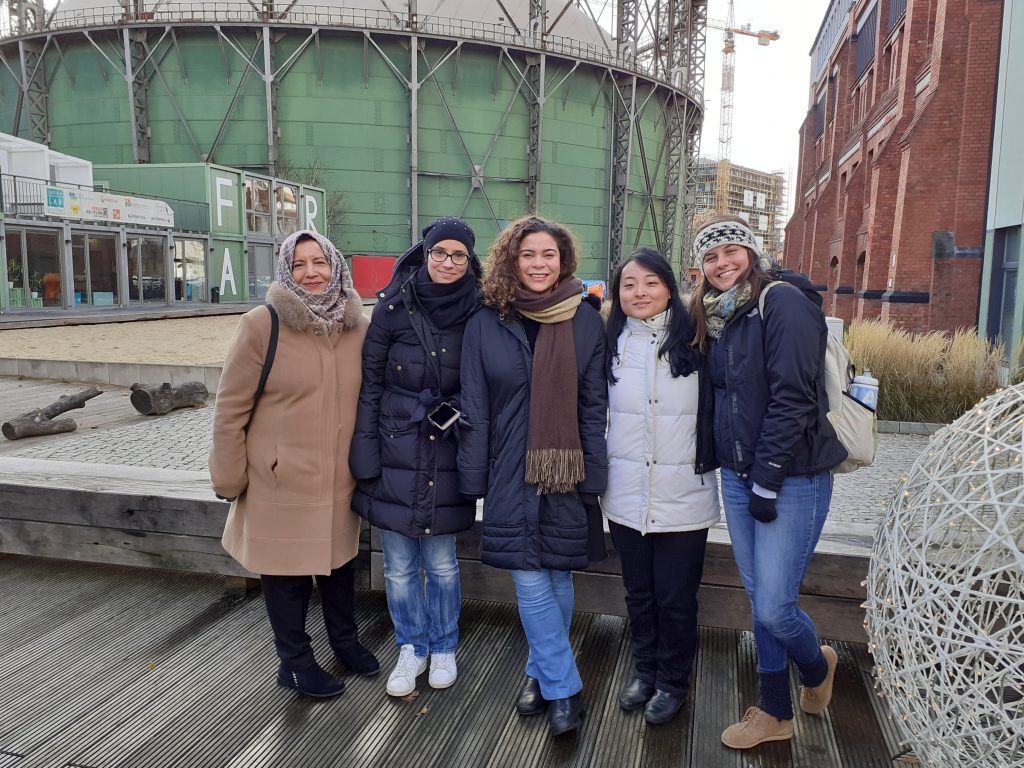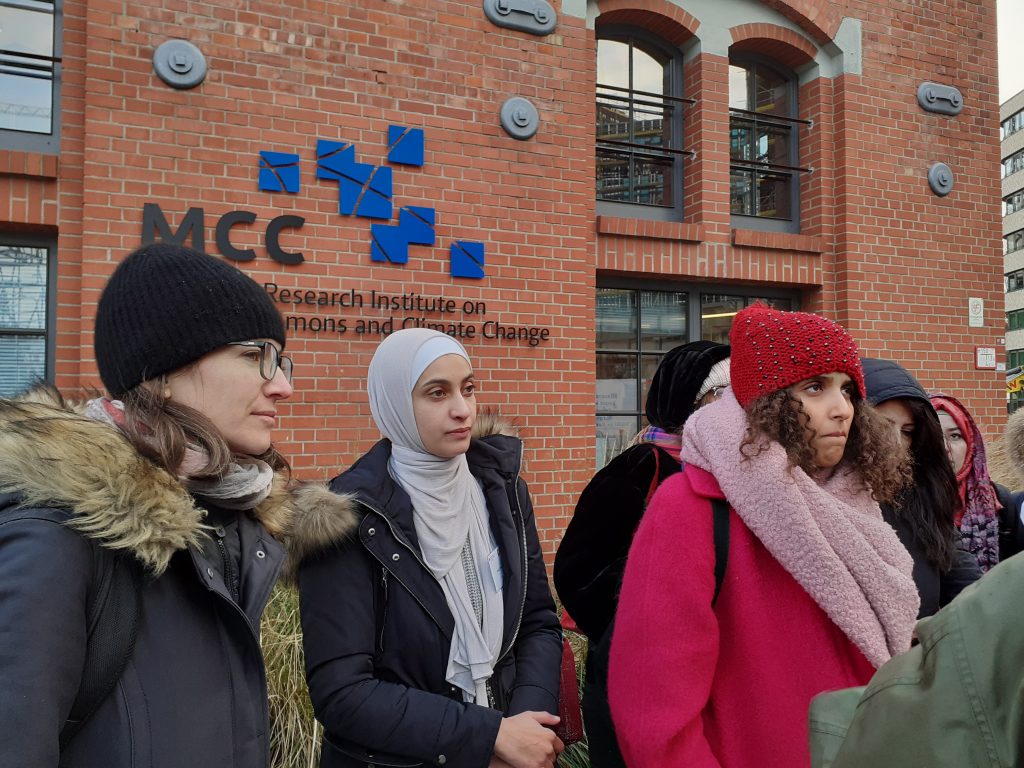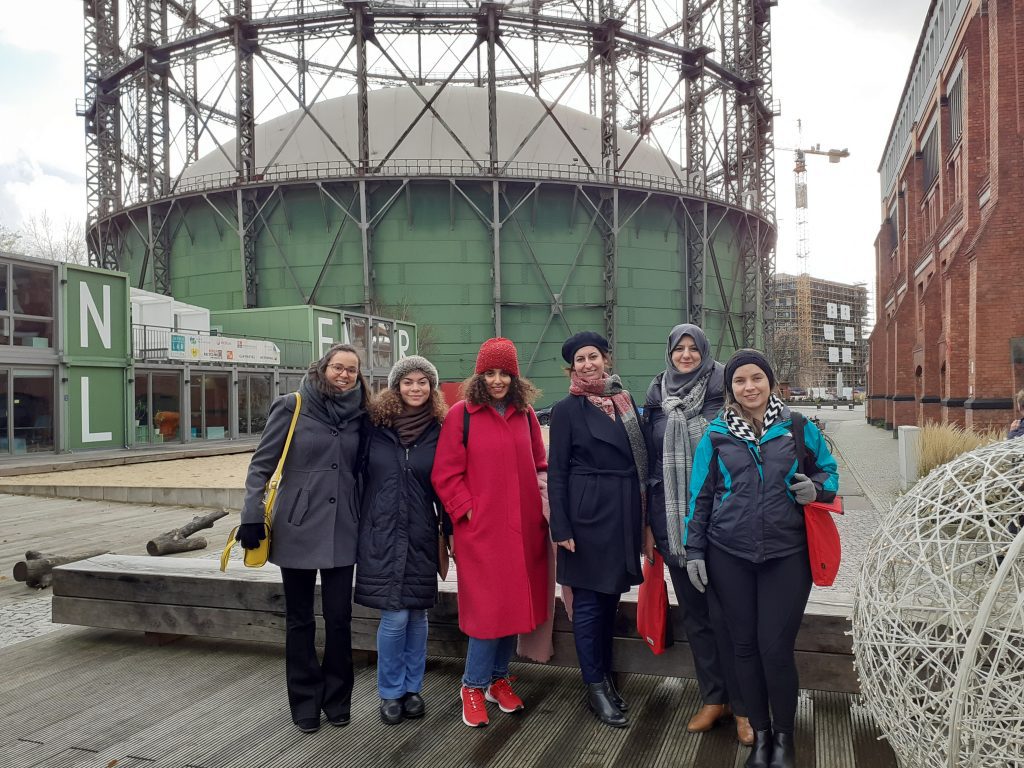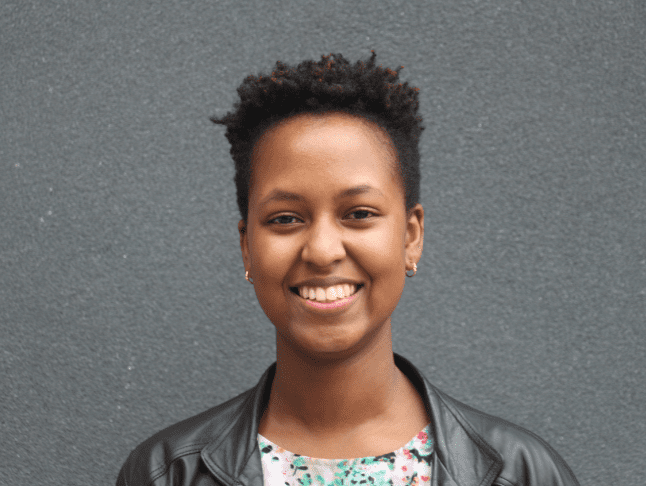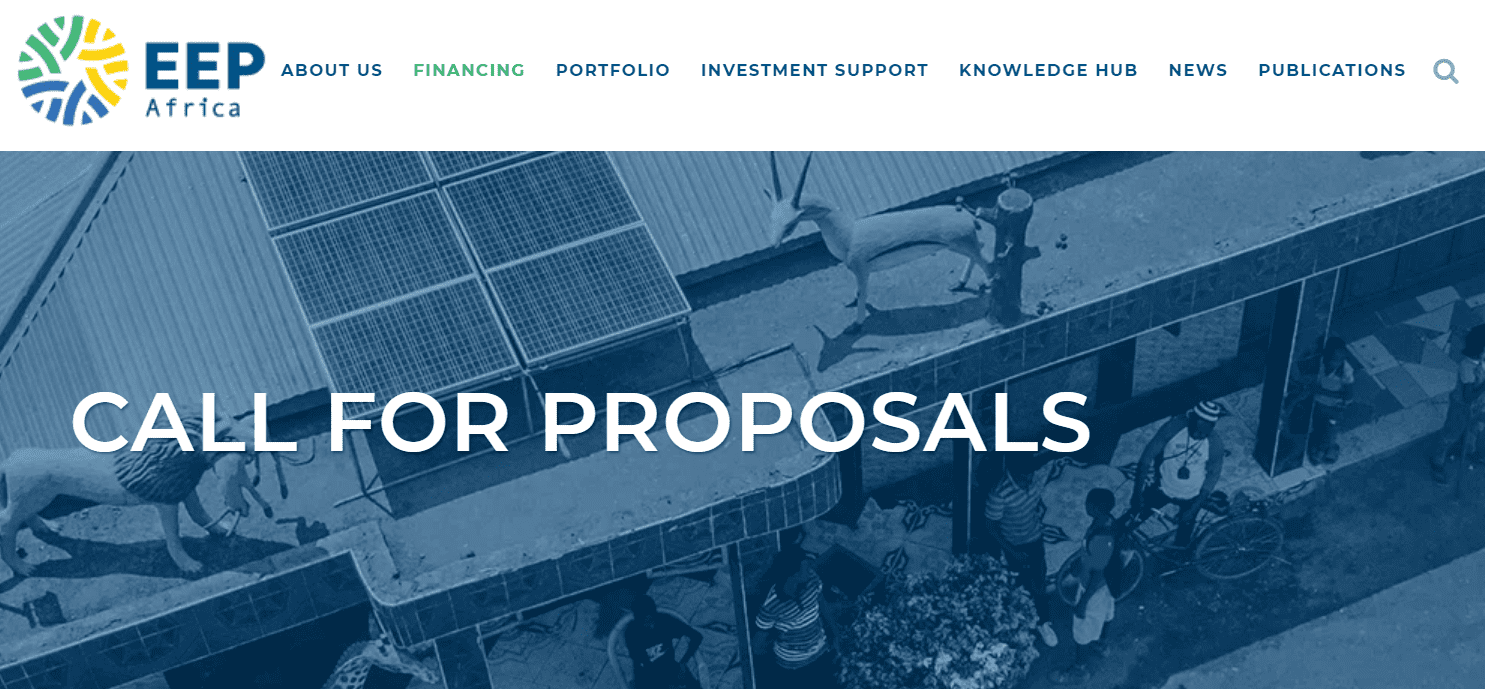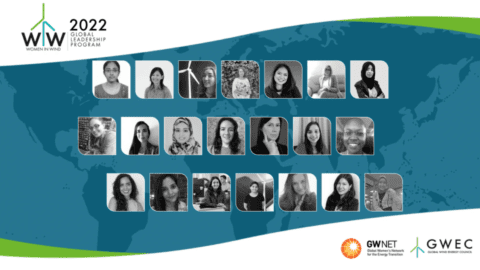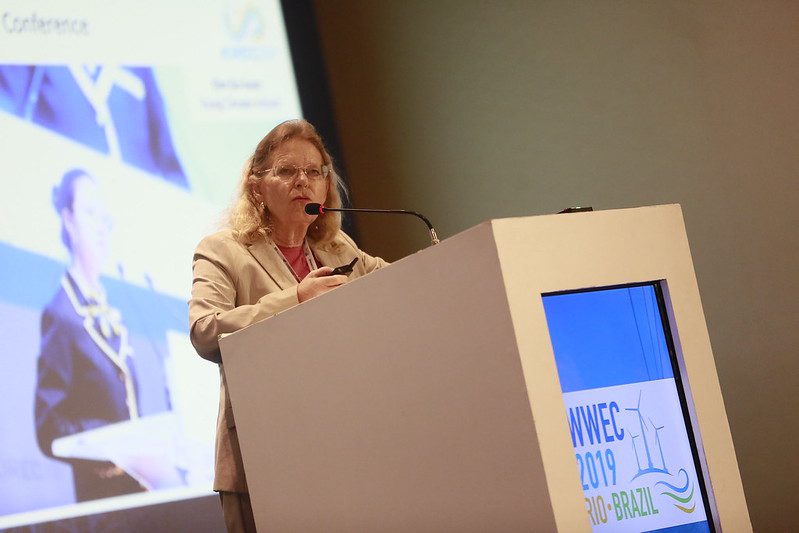During the last week of November (25th to 29th 2019), GWNET with support from the German Federal Ministry of Economic Affairs and Energy (BMWi), hosted a dedicated study tour in Berlin for participants of the newly launched mentoring programme for women in Latin American Countries (LAC) and the Middle East and North Africa (MENA) region.
With 20 sustainable energy professionals from Algeria, Brazil, Jordan, Mexico, Morocco and Tunisia, this study tour was part of a larger effort to advance the role of women as agents of change in society and promote best practices within the sector.
Packed with high-level networking meetings, conferences, workshops and site visits, the week was full of excitement, learning, connections and growth. We’re excited to share some of our experiences and lessons learned below.
Day 1: Transition
We started off on a high note at the headquarters of BMWi (co-organisers of the study tour), welcomed by Dr. Christine Falken-Grosser, Head of Division – Bilateral Energy Cooperation (BMWi), Karin Franzen, Bilateral Energy Partnerships – Senior Advisor to the BMWi (GIZ), and Ellen von Zitzewitz, Deputy Director of International Energy Relations (BMWi).
Discussions revolved around the Energiewende – Germany’s long term plan for energy and climate change, as well as the various ways BMWi is supporting women’s involvement in the energy transition.
It was interesting to hear about the investments made in promoting electric mobility, as well as federal support for Research & Development (R&D) in support of the energy transition. Also highlighted were the key energy partnerships created to foster continuous dialogue and boost cross-country learning.
With 20 mentees from Latin America, the Middle East & North Africa, there were a multitude of perspectives expressed, allowing the group to identify shared experiences while opening up the door to new insights.
“We have people from Africa and from South America, and we met a lot of people from Europe. Despite all the differences we all have the same challenges and very similar problems to overcome. I thought the human part of this programme was the most important thing that I learned and I’m very glad to be here.”
Caroline Faria: Co-founder, BioHack Projetos e Participações Ltda, Brazil
“The most important takeaway from the study tour was first getting in touch with the right women in the energy field and also learning more about the energy transition concept in Germany and how the political and legal framework in Germany supports the energy transition.“
Farah Dawoud: Head of Landfills and Transfer Stations Section, Ministry of Local Administration, Jordan
Day 2: Transformation
Day two was all about Transformation. We spent the day at the dena Energiewende Kongress which brought together over 800 women and men to engage on the energy transition in cities, as well as the social acceptance of this transition.
One recurring call to action was to think outside the box when it comes to innovating, with the end goal of positively transforming towns, cities and eventually countries – “transformation cannot occur with existing paradigms.”
Other key points made included the need to: look at transformation in a holistic manner, champion interdisciplinary work, pursue a just transition, and focus on integrated network infrastructure.
The highlight of the congress was the women’s lunch which brought together 70 women professionals in the energy sector with the goal of fostering global connections and encouraging networking.
We were also lucky to wrap up the day with a group session with Carolin Krolik, Personal Assistant to the Head of Communications (dena), where we had the opportunity to share our experiences, questions, and highlights from the day.
“I found that the study tour was very rich with the quality of participants; everyone is a leader in her field in her country. I was very interested in knowing more insights about the energy field and the projects that are running in each country and benchmarking women’s participation worldwide.” Diana Athamneh: Project Management Specialist, JREEEF outsourced by CowaterSogema Int., Jordan
Day 3: Inclusion
Deutsche Gesellschaft für Internationale Zusammenarbeit (GIZ) GmbH were our hosts for the third day, which was a whirlwind of lively discussions on how to achieve an inclusive energy transition.
Our speakers for the day were:
- Torsten Fritsche, Program Director (GIZ)
- Jana Narita, Project Manager (adelphi)
- Sebastian Jasim, Head of International Projects (German Renewable Energy Federation (BEE))
- Farah Mohammadzadeh, Project Manager – Training Programme Energy Transitions (Agora Energiewende)
- Catalina Avila, Project Director (the Renewables Academy)
- Carolin Krolik, Personal Assistant to the Head of Communications (dena) and CEO (Hypatia)
- Franziska Schuth (Women of Wind Energy)
- Irina Gaubinger, Project Manager (GWNET)
We looked at the energy transition from different angles, including technologies, energy partnerships, women in leadership, renewable energy education, and women’s networks.
What came out strongly was the need for forward thinking policies and actions to keep up with the acceleration of technological solutions, the need for flexibility on the supply & demand of energy, the amazing potential of cross-country collaboration, and the importance of supporting women in renewable energy through training and networking opportunities.
Irina Gaubinger also led participants through the upcoming GWNET study on “Women in the Energy Sector: Strategies for Increased Diversity and Inclusion.” Her presentation answered the resounding question “what can we do to increase women’s employment in the sustainable energy sector in the future?”
After an info-rich day, we wound down with a delicious dinner, getting the chance to know each other more deeply in a casual setting.
“It was a great pleasure to participate in this study tour. It was very interesting to enter into contact with women from different cultures and technical backgrounds from the MENA and Latin American countries. Also the dinner event was a great opportunity for me to enhance my connections and it could give me a huge opportunity and access to more job opportunities.”
Afef Ben Abda: Climate change and Energy Specialist, UN-FAO, Tunisia
Day 4: Presentation
Presentations are part and parcel of all areas of work, yet few people have truly mastered the skill of holding an audience’s attention and effectively communicating their message – “the world belongs to those who can share ideas.”
That’s why the fourth day of the study tour was focused on sharpening presentation and public speaking skills, with a specific look at: structure, stage anxiety, preparation, visual aids, body language, audience connection, confidence, persuasion, framing for different audiences, and speaking in front of a microphone or camera.
With support from with Dyane Neiman and the Moving Speaker team, this incredible hands-on journey involved us facing fears about addressing groups, challenging any limitations set by ourselves or others, and working together to identify our weaknesses, bolster our strengths, and eventually exceed expectations.
“I’m very happy to be part of this programme and this study tour. I enjoyed the activities and the workshop. I would like to thank all the organisers and funders of this programme.”
Soumaya Bentassil: Head of Mosque Management Service and Energy Efficiency Project Manager, Ministry of Habous and Islamiques Affairs, Morocco
Day 5: Energy, Mobility & Sustainability
We wrapped up an incredible week of networking and learning with a site visit to the EUREF campus, an intelligent city built on 3 pillars: Energy, Mobility, and Sustainability. Located in Berlin, this smart city is a hub of projects birthed through innovation and collaboration.
The tour was led by Ralf Wollheim, who guided us through the different facets of the smart city, while sharing the ethos that has made this city possible. Mariem Khemir, E-Mobility Project Engineer (Schneider Electric), also shared the current and future electric mobility projects that her company was working on, while giving us a sneak peak into the operations and maintenance of EUREF.
In the midst of this, we tried out VR and electric mobility devices, many of us for the first time…All of these experiences gave us insight into the endless possibilities of the renewable energy sector and motivated us to bring these learnings to our own projects in our respective countries.
“This experience was more than I was expecting. I knew it would be very good, but it was amazing and excellent. Germany has always been an example for me, in environmental matters, the energy transition, and renewable energies, but being this close to the projects was a unique opportunity to know how to do it. How can I bring this back to Brazil? How can we improve our environmental policies and how can we get closer to a sustainable community? I’m very thankful for this opportunity and I’m very proud to be part of GWNET because I believe the energy transition is possible and I also believe it will be made by women.”
Natalia Chaves: Environmental Assistant, AHK Rio de Janeiro
The success of this study tour can be attributed to various people and organisations, who welcomed us and shared their work, ambitions and goals for the energy sector. Thank you for being part of our journey.
Most of all, we are incredibly grateful to our participants who made the #GWNETStudyTour incredible, through their desire to continuously learn, share, collaborate and grow. We can’t wait to see the impact you will have in your countries as sustainable energy experts.
Image Credits: GWNET
Day 4 Image Credits: Run Zhang-Class


